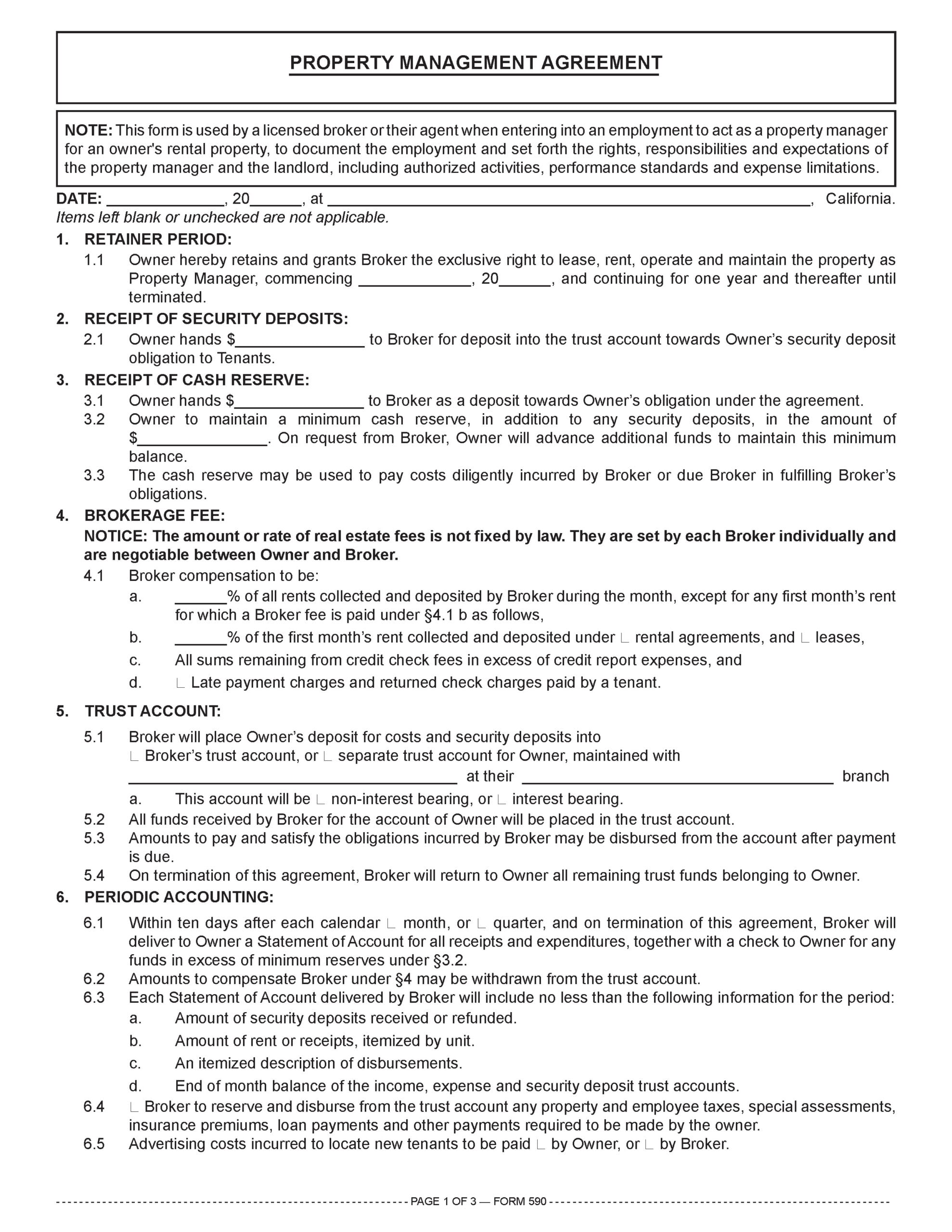This form is used by a licensed broker or their agent when entering into an employment to act as a property manager for an owner’s rental property, to document the employment and set forth the rights, responsibilities and expectations of the property manager and the landlord, including authorized activities, performance standards and expense limitations.
Authority to operate a rental property
Property management is an economically viable and personally rewarding real estate service permitted for real estate licensees. Serious brokers and agents often turn their attention from services rendered in residential sales to the specialized and recession-proof discipline of property management.
The duty of care a property manager owes a landlord is the same duty of care and protection a broker in real estate sales owes their sellers and buyers. As a property manager, the broker is an agent acting in the capacity of a trustee on behalf of the landlord.
A property manager’s authority to take possession and control of income-producing real estate and manage its leases, rents, expenses, mortgage payments and accounting in expectation of a fee is established in a property management agreement. [See RPI e-book Real Estate Property Management, Chapter 8]
The property management agreement sets out the specific rights, responsibilities and expectations of the property manager and the landlord who employs them, including authorized activities, minimum performance standards and expense limitations. [See RPI Form 590]
Landlord responsibilities include providing the property manager with the information and items necessary to properly manage the property and its tenants, such as:
- copies of existing lease and rental agreements;
- service and maintenance contracts;
- utilities information;
- keys and security devices;
- security deposits; and
- information on hazard and worker’s compensation insurance for the property and employees.
The property management agreement authorizes the property manager to:
- locate tenants;
- enter into rental and lease agreements, including leases for a term of over one year;
- deliver possession of units or space;
- collect rents;
- incur operating expenses; and
- disburse funds to pay expenses, mortgage payments and management fees. [Calif. Civil Code 1624(a)(3)]
Related, a resident manager is employed by either the landlord or the property manager who manages the apartment building or complex. The resident manager lives on the premises as a requirement of their employment. The on-site resident manager handles the daily operations of an apartment building comprising 16 or more residential units. [See RPI Form 591]
The property management agreement
A licensed broker or their agent uses the Property Management Agreement published by Realty Publications, Inc. (RPI) when entering into an employment to act as a property manager for an owner’s rental property. The form allows the broker to document the employment and set forth the rights, responsibilities and expectations of the property manager and the landlord, including authorized activities, performance standards and expense limitations. [See RPI Form 590]
The Property Management Agreement contains:
- a retainer period, documenting the time period for which the owner grants the broker the right to maintain the property as property manager [See RPI Form 590 §1];
- security deposits the broker will deposit into a trust account [See RPI Form 590 §2];
- a receipt of cash reserve detailing the money the owner hands the broker as a deposit and the minimum cash reserve the owner will maintain [See RPI Form 590 §3];
- the brokerage fee the broker will earn [See RPI Form 590 §4];
- the trust account where the broker will place the owner’s deposits [See RPI Form 590 §5];
- periodic accounting requirements imposed on the broker [See RPI Form 590 §6];
- title conditions and loans on the property [See RPI Form 590 §7];
- broker agreements [See RPI Form 590 §8];
- owner agreements [See RPI Form 590 §9];
- termination terms [See RPI Form 590 §10];
- general provisions [See RPI Form 590 §11]; and
- signatures of the broker and owner. [See RPI Form 590]
Form updated 2016.
Form navigation page published 11-2015. Updated 05-2023.
Form-of-the-Week: Property Management Agreement and Change of Owner or Property Manager — Forms 590 and 554
Form-of-the-Week: Property Management Agreement — Form 590
Article: Becoming a property manager in California
Page: Property Management 101
Book: Real Estate Property Management, Chapter 8: Property management agreement
Video: Property Management – Licensing and Responsibilities
Video: Licensed vs. Unlicensed Property Management Activities














